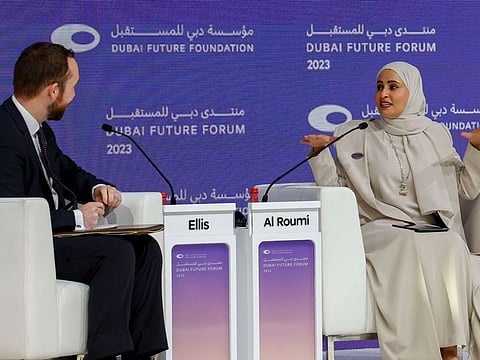All the ways in which the UAE is preparing for the future highlighted at Dubai Future Forum
Ohood Al Roumi, Minister of Government Development and Future, gave keynote address

Dubai: How can policymakers effectively meet the needs of future generations? This was the question addressed by Ohood Al Roumi, UAE’s Minister of State for Government Development and Future, in a keynote address at the second day of the Dubai Future Forum.
The Dubai Future Forum is an annual event hosted by the Dubai Future Foundation at the Museum of the Future. It is the biggest gathering of futurists in the world, attended by foresight practitioners, thought leaders and experts from academia and various industries as well as government.
Talking about how governance, at its core, has a dual responsibility, which is addressing today’s needs while also sharing tomorrow’s path, she said: “Having a future-oriented thinking is not new, it is embedded in the global heritage.”
She spoke about the different traditions across the world that had a history of prioritising the needs of future generations in their everyday practices, and highlighted how this was also a practice in the Arab world.
“I would like to share an example from our region - centuries ago, the Arab tribes were not just surviving in the desert, they were planning decades ahead. We used to have environmentally protected areas, where use of water or the cutting of trees was prohibited. We did that to protect resources and ensure sustainability, leaving a legacy for the future generations,” she said.
When it comes to the UAE, specifically, Ohood Al Roumi said that a future-oriented approach was always a part of governance.
“Our founding fathers always had the interest of future generations in their minds and hearts. Back then, we were the future generation, and we are enjoying prosperity now because of what they planted back then,” she said.
Lessons from history
She also shared stories from the UAE’s founding fathers, which she said were close to her heart. The first was on how the late Sheikh Zayed Bin Sultan Al Nahyan, the founding father of the UAE, focused on the environment, turning the desert into a green oasis.
“Our founding father, Sheikh Zayed, had a visionary approach to the environment. Shortly after the formation of the UAE, he embarked on an ambitious jouney to ‘green the desert’. His aim was not just to preserve the resources that we have but expand them. This journey was thought impossible by many international experts, but he embarked on this journey because he understood the importance of green space for the environment, for the future generation. Because of him, we now have more than 150 million trees in the UAE. This is in line with our approach to tackle climate change,” Al Roumi said.
She also shared a story of the visionary approach of the late Shaikh Rashid Bin Saeed Al Maktoum, the former Ruler of Dubai, who built the Rashid Port in 1972.
“In 1976, just four years later, he decided that he wanted to build another port in Dubai, the Jebel Ali port. Many businessmen were against this, as they didn’t see a reason for building another port 40 kilometres outside the city centre, but he was determined. He said that he was not building it for today but for the future. Fast forward by half a century – Jebel Ali Port stands as the 11th busiest port in the world and DP World manages more than 90 ports around the world, creating economic prosperity for the future generation," she said.
Forging the future
This visionary thinking is still a part of the UAE’s leadership, Al Roumi said.
“We still have an exemplary leadership that always looks ahead. We enjoy a very good level of prosperity right now, we lead in 180 global indicators, but let me borrow the words of President His Highness Sheikh Zayed Bin Sultan Al Nahyan who said that we want the coming generations to be even more prosperous than the current one. And let me share with you the words of His Highness Sheikh Mohammed bin Rashid Al Maktoum, Vice President and Prime Minister of the UAE and Ruler of Dubai that are engraved on this museum – ‘We don’t wait for the future, we create it’,” she said.
She spoke about all the ways in which future foresight is part of the UAE’s governance today. From the UAE Centennial Plan 2071, which plans for the UAE to become the best country in the world by 2071, to the focus on the UAE’s human capital – its population is very young, with more than 40 per cent under the age of 30, according to the Minister.
“They represent our present and our future. It is very important that we bring this future to the table, so empowering youth is central to our agenda. We have a dedicated minister of youth, we have a national youth strategy, numerous youth councils and a strong representation of youth in governance. It is very important to not just listen to them but give them the opportunity to shape and influence decisions that will shape their future,” she said.
Al Roumi also highlighted how the UAE was focusing on education, with preparing today’s youth for jobs of the future, that do not yet exist. The UAE has an ambitious space programme, a newly established National Space Academy, a dedicated minister of Artificial Intelligence (Omar Sultan Al Olama, Minister of State for Digital Economy, Artificial Intelligence and Remote Work Applications) and even a university focused on AI - Mohamed bin Zayed University of Artificial Intelligence.
She stressed on the importance all these tools of governance play in shaping today’s youth for the future.
Sign up for the Daily Briefing
Get the latest news and updates straight to your inbox








